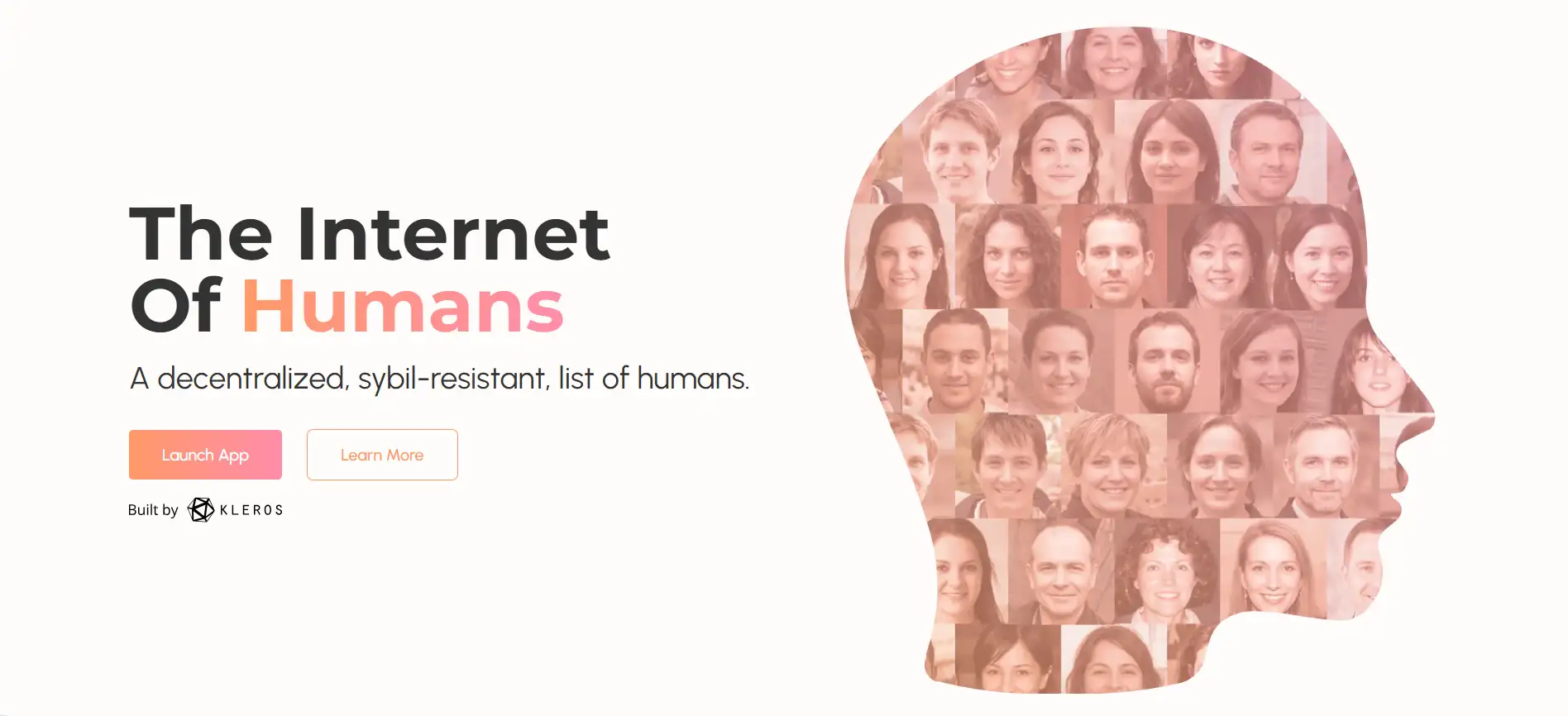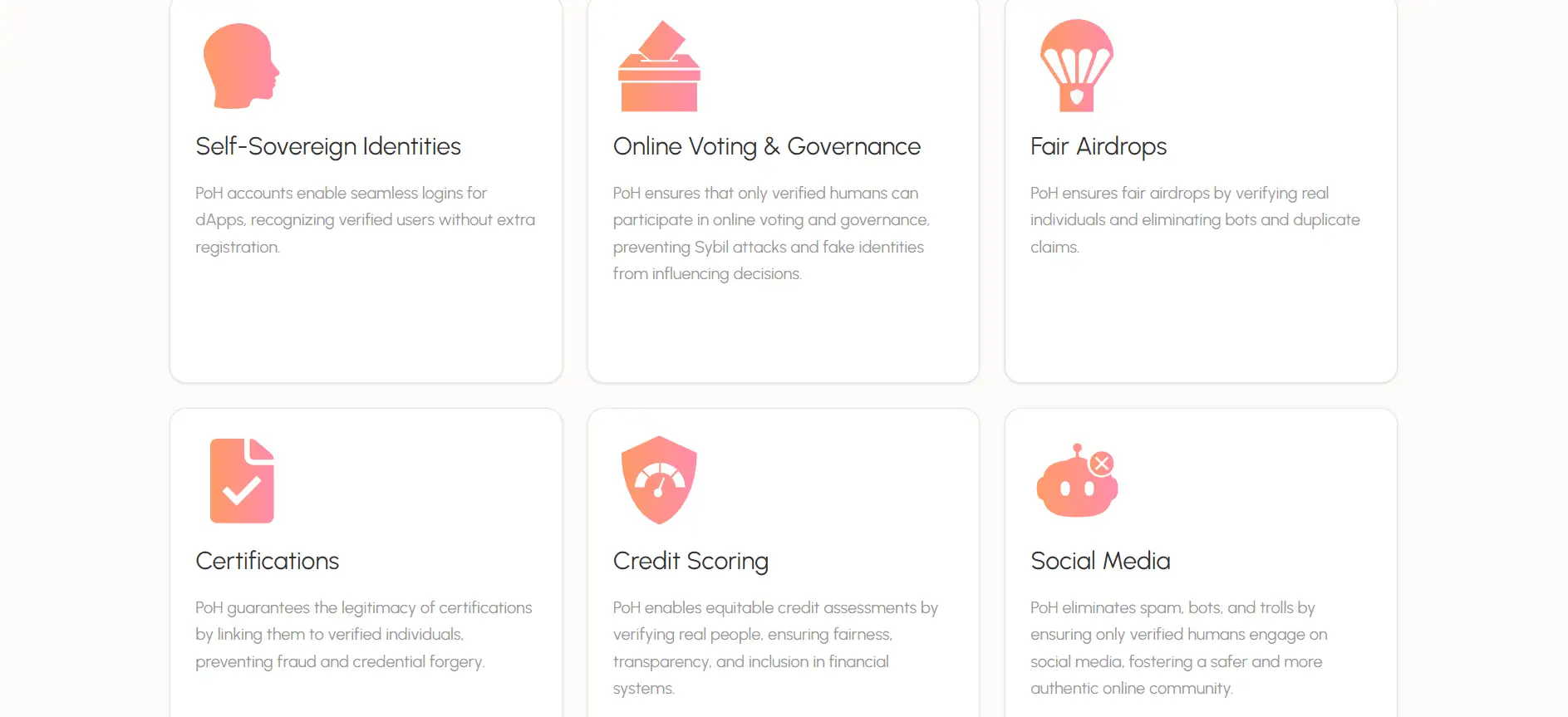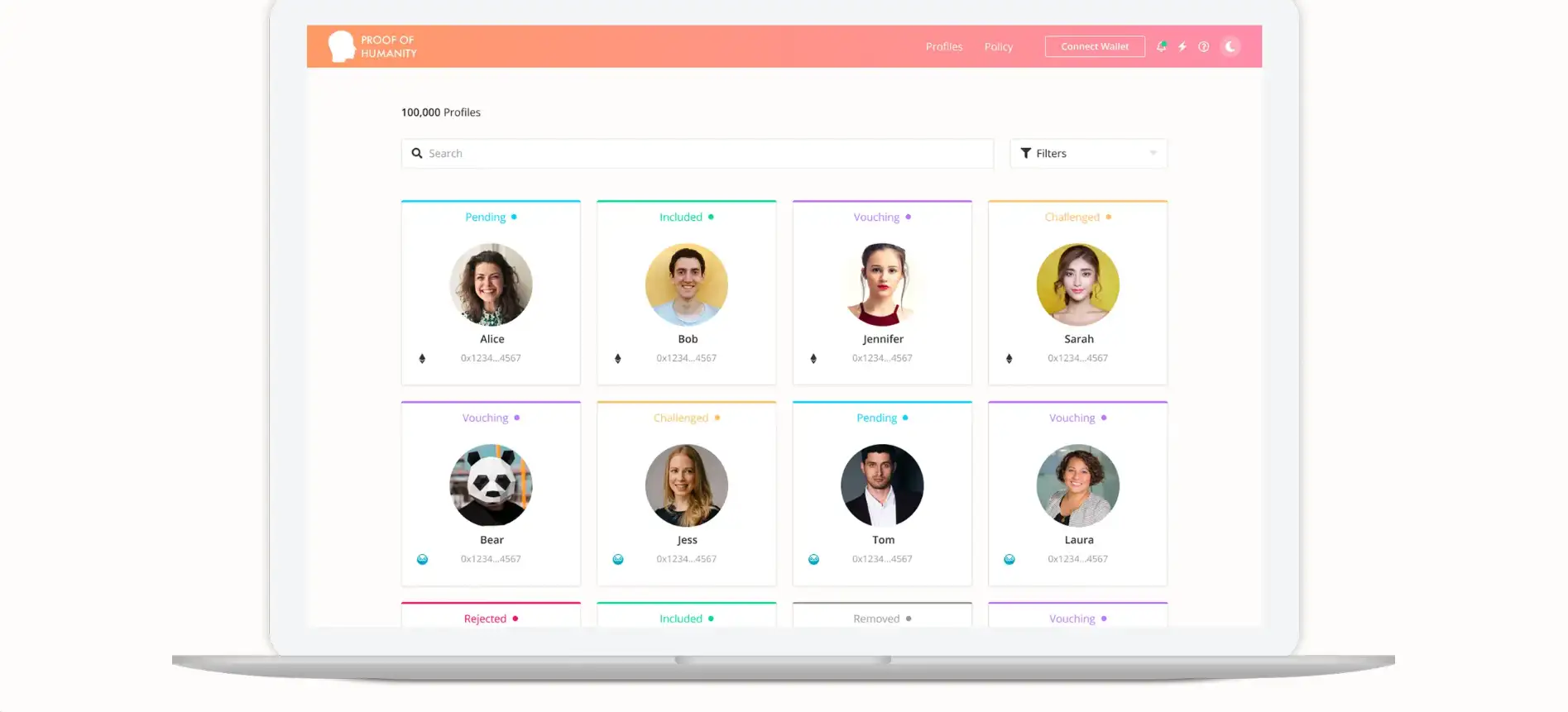About Proof of Humanity
Proof of Humanity (PoH) is a decentralized identity protocol designed to create a verifiable, Sybil-resistant registry of real human beings on the blockchain. Combining video verification, community vouching, and dispute resolution via Kleros, PoH enables a wide range of decentralized applications to ensure fairness, trust, and human exclusivity in their operations.
By building a universal list of verified individuals, Proof of Humanity addresses one of the most critical challenges in Web3: Sybil resistance. Whether it’s for voting, airdrops, identity-backed certifications, or fair social participation, PoH makes it possible to verify that users are real, unique humans—without centralized intermediaries.
Proof of Humanity is a pioneering project that combines decentralized identity verification with the power of blockchain governance. It creates a public, open-source registry of verified humans that any dApp or smart contract can reference to restrict access or actions based on human uniqueness. The system was initially bootstrapped with a trusted seed group of users and has since grown organically through a process that requires users to submit a video, a profile, and be vouched for by existing registry members.
The PoH verification process is community-driven. Once a user submits their profile, they must receive a vouch from a registered human and stake a refundable deposit. The profile then enters a pending state during which any community member can challenge it. If challenged, the dispute is settled through Kleros, a decentralized arbitration protocol. If unchallenged or victorious, the user becomes part of the human registry. This approach effectively eliminates bots, deepfakes, and multi-account Sybil attacks.
PoH is already being used across a variety of use cases. In governance, it ensures only real people vote, enhancing the legitimacy of DAOs. In airdrop distributions, it ensures fairness by eliminating fake accounts. In social platforms, it can be used to reduce spam and impersonation. For certifications and credit scoring, it brings a layer of verified identity that enhances trust and transparency.
The project maintains strong technical infrastructure, with an open API for developers, a Gitbook registration tutorial, and a Kleros-backed challenge system that has stood the test of time. PoH also supports integration with other protocols through a set of smart contract functions like isHuman() and getHumanityInfo(), making it easy for projects to integrate human verification logic.
Competitors in the identity space include Worldcoin, Verus, and Idena. However, Proof of Humanity distinguishes itself through its full decentralization, transparent governance, and community-enforced trust mechanisms that do not rely on biometric devices or proprietary tech.
Proof of Humanity offers powerful features and benefits that promote fairness, transparency, and decentralization across Web3 ecosystems:
- Sybil-Resistance: Ensures only unique, verified humans can register, preventing bots and duplicate accounts.
- Open Participation: Anyone can apply and join the registry by following the community-driven verification process.
- Self-Sovereign Identity: Once verified, individuals can use their PoH profile to log into dApps without extra registration.
- Onchain Governance: Provides a trusted layer for DAOs to enable fair, one-human-one-vote elections.
- Fair Token Distribution: Used to ensure fair airdrops, UBI distribution, and reputation-based rewards.
- Challenge & Dispute System: Users can challenge fraudulent submissions with support from Kleros jurors.
- Anti-Spam for Social Media: Ensures that online communities stay bot-free and human-authenticated.
- Reusable Identity Layer: Easily integrated into any Web3 application for human verification and sybil-protection.
- Transparent Governance: Community members participate in policy decisions via Snapshot voting.
- Developer Friendly: Comes with APIs and smart contract interfaces for seamless protocol integration.
Getting started with Proof of Humanity is a transparent and community-driven process that allows anyone to verify their identity and join the registry:
- Step 1 – Create Your Profile: Visit the Proof of Humanity app and submit your profile including name, photo, and a short video.
- Step 2 – Lock a Deposit: Send the required Gnosis Chain token deposit to enter the registry. This deposit is refunded after successful verification.
- Step 3 – Get a Vouch: Ask a registered human to vouch for your identity. A single vouch is enough to move forward.
- Step 4 – Wait for the Challenge Window: Your profile will be in the pending state for 3.5 days during which it can be challenged by others.
- Step 5 – Dispute Resolution (if needed): If challenged, your case is sent to Kleros Court where jurors evaluate the claim.
- Step 6 – Get Registered: If not challenged—or if the challenge is resolved in your favor—your profile is added to the PoH list.
- Step 7 – Use Your Humanity: Use your verified status for voting, token claims, logins, or integrations with other Web3 services.
Proof of Humanity FAQ
Proof of Humanity uses a combination of video verification, vouching, and community oversight to ensure each profile represents a real individual. Every applicant must upload a video introducing themselves, which is then verified by an existing registered human through a vouching process. The system is open for anyone to challenge suspicious profiles, and disputes are resolved through the Kleros Court—a decentralized arbitration protocol that ensures fair outcomes through crowdsourced jurors.
If your submission is challenged, your case is automatically escalated to Kleros for decentralized dispute resolution. Jurors review the submitted materials—your video, photos, and vouches—to determine whether your profile meets the registry policy standards. If you win the case, your deposit is refunded, and your profile becomes officially verified. However, if the challenge succeeds, the deposit is forfeited, and the profile is removed from the registry.
Yes. Proof of Humanity offers an open API and smart contract interface that allows DAOs, Web3 platforms, and decentralized applications to verify if a given wallet belongs to a real human. Developers can integrate using simple Solidity functions such as
isHuman(address)orgetHumanityInfo(bytes20)to restrict access, prevent Sybil attacks, or enable human-only governance. This feature is widely used across governance systems, airdrops, and onchain reputation models.Proof of Humanity incentivizes community members to challenge fraudulent or duplicate profiles. When a challenge is proven valid through Kleros arbitration, the challenger earns a portion of the deposit placed by the malicious profile. This model ensures active community participation in maintaining the registry’s quality and deters fake entries. Additionally, users who vouch responsibly help the ecosystem remain healthy and trustworthy for applications that depend on verified human data.
Proof of Humanity is actively developing methods to defend against AI-generated deepfakes by combining human review and machine learning detection tools. Since video and audio are mandatory for submissions, challengers and Kleros jurors can analyze suspicious content manually and algorithmically. PoH continuously updates its registry policy and collaborates with the open-source community to strengthen defenses against synthetic identities, ensuring the system remains robust even as deepfake technology evolves.
You Might Also Like












